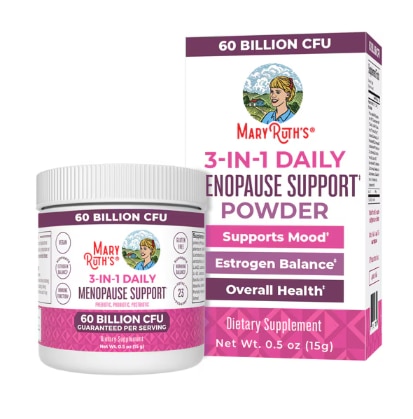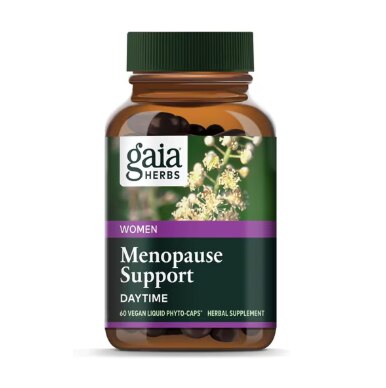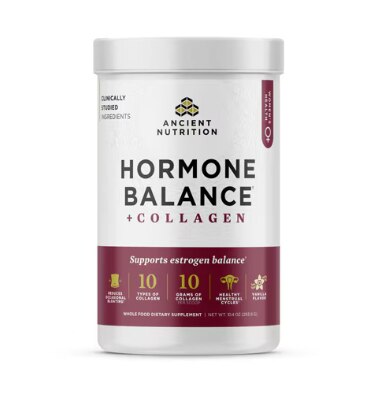Myths surrounding women’s health abound. Have a urinary tract infection? Cranberry juice will cure it. Eyeing oral contraceptives? Be prepared to see a higher number on the scale. From the belief that osteoporosis is an issue you don’t have to concern yourself with until your 60s to the notion that men are more prone to heart disease than women, it’s all too simple to lead a life that may run counter to what’s best for your wellness.
Add menopause to the mix. Not only is it frequently painted as an “end” to a woman’s sensuality, vitality and waistline, but it’s also rife with medical misconceptions.
The problem?
Falsities can keep the 1.3 million U.S. women who undergo menopause per year from obtaining the support they need—and inadvertently forcing them to suffer in silence.

We’re here to debunk the old wives’ tales that plague our grasp on this phase. Below you’ll find 7 of the most widespread menopause myths, and 7 ways to ride through this time in life with ease.
Menopause myth #1: Your sex drive will take a nosedive
Blame older media for the often-parodied image of a menopausal woman: Flat-eyed, drearily, even shabbily dressed, and completely disinterested in intimacy.
Luckily, female celebs and influencers have rioted against this cliché—Charlize Theron’s recent confessions are all the evidence we may need—but what sticks in many minds is the illusion that women lose their libido the second they blow out 45 candles on their birthday cake.
Where does this stem from?
From some truth: A percentage of women may indeed feel a dip in their sex drive. A 2019 study, for example, discovered that sexual function and desire diminished approximately 20 months before women had their final period. Meanwhile, older studies indicate that fewer than half of women between the ages of 57 and 73 claimed they were sexually active (but this is post-menopause, mind you).
The reasons behind this are both uniform and unique. Estrogen, or what I like to call the “feminine hormone,” naturally declines during perimenopause and menopause. This may reduce blood flow to your female parts and translate into I’d rather read a book. Plummeting estrogen levels can also contribute to vaginal dryness, itching, burning and, as you might imagine, painful sex. To top it all off, perimenopause and menopause may give rise to psychological changes that can impact your capacity for arousal.
And yet, women in perimenopause may be just as likely to feel a surge in their sex drive. See, your hormones during this era don’t just go into a freefall; rather, they fluctuate. At the same time, women during this stage may be influenced by changes in their life that fuel their libido, from no longer having children at home to feeling more comfortable with their partners and experiencing the liberation that often arrives with age. In other words? Sexual desire is entirely individual.
The solution: If your sex drive has waned but you’re still craving intimacy, consider bumping up your supplements. For one, L-arginine (an amino acid that plays a role in building proteins) may organically promote healthy circulation, which is key to sexual pleasure. Also, Olly’s Lovin’ Libido is jam-packed with traditional botanicals—including maca, damiana and ashwagandha—to naturally support desire and satisfaction.†
Menopause myth #2: You can say goodbye to birth control
Derived from Greek, menopause literally means “the cessation of the month,” or, as we’ve come to know it, the conclusion of your menstrual cycle.
Bear in mind, however, that perimenopause and menopause are two distinct stages: Perimenopause refers to the years leading up to menopause, while menopause is medically defined as going 12 consecutive months or longer without a period.
To phrase it differently, it’s wholly possible to conceive during perimenopause—yes, even if your period only arrives every two to three months…or otherwise seems to be playing a game of peek-a-boo. (Post-menopause, your ovaries will stop generating mature follicles which release viable eggs, rendering conception extremely rare.) Meaning, of course, that unless you’re eager to become pregnant, it’s best to continue using your tried-and-true form(s) of birth control until menopause itself occurs.
The solution: Use some form of birth control until your gynecologist has measured hormone levels to show that you’re safe. I test my patients blood levels of FSH and estradiol on day #3 of their cycles, 3 months in a row, to determine if they are still potentially fertile or not. High levels of FSH suggest strongly that there is a very small chance, if any, that they could become pregnant. Discuss this option with your gynecologist.
Menopause myth #3: Hormone replacement therapy is a huge hazard
If ever there’s a myth that desperately needs to be quashed, it’s the outdated but prevailing belief that hormone replacement therapy (HRT), which is increasingly known as Menopausal Hormone Therapy (MHT), is deleterious to your health.
This is due to a 2002 study. Helmed by the National Institutes of Health (NIH) and dubbed the Women’s Health Initiative, it discovered a correlation between hormone replacement therapy and an elevated risk of breast cancer, stroke and blood clots. The problem? The women studied were older (as in 65+, or post-menopause); further, they were only given treatment for a short time.
Fortunately, reevaluations of the Women’s Health Initiative and follow-up studies—which consisted of researching 160,000 women between the ages of 50 and 79—concluded that HRT is a “safe and effective treatment” for women under the age of 6o. In addition, data reveals that HRT may be a boon in terms of nurturing:
- Cognition
- Mood
- Cardiovascular, colon, bone and heart health
- Sleep
The solution: Have a frank conversation with your trusted healthcare provider. If you’re wrestling with menopause’s most aggravating symptoms and can’t seem to find relief, HRT may be an option.
That said, women with underlying health conditions, such as a history of stroke, breast, ovarian and uterine cancer—as well as abnormal vaginal bleeding and liver disease, among other complications—might not qualify as viable candidates. If that’s the case, your doctor may recommend alternatives like lubricants, antidepressants, and/or selective estrogen receptor modulators (SERMS).
Menopause myth #4: …and yet, HRT is the only way to relieve menopause’s most prevalent symptoms
In a word: Hardly. Natural remedies for menopause symptoms are downright legion. These include:
Piling your plate with phytoestrogens: “Phytoestrogens” refers to plant-based compounds that mimic estrogen in the body. While further studies are needed, they may alleviate hot flashes, nourish bone health and bolster cognition. Foods rich in phytoestrogens include:
- Flaxseeds
- Edamame
- Dried apricots
- Berries
- Alfalfa sprouts
- Legumes
Avoiding foods that trigger vasomotor symptoms: Grappling with hot flashes that feel like you’re burning from the inside out, or night sweats that leave you clammy, irritable and sleep deprived? Rethink the spices in your life. Jalapenos, salsa, curries, cayenne pepper—all can raise your internal thermometer and magnify menopause’s cardinal symptoms. Remember, too, that vasomotor symptoms aren’t just annoyances: Research performed by the Journal of the American Heart Association demonstrates that the sleep disturbances caused by vasomotor symptoms may heighten your susceptibility to atrial fibrillation (or an irregular pulse). My advice? Pass on the Tabasco at brunch.
Prioritizing exercise: A large body of research illustrates that physical activity can be a goldmine for women who are going through perimenopause and menopause. Not only does exercise help keep your weight in check, but it may also reduce your risk of developing two other hallmarks of menopause: Depression and anxiety. It doesn’t matter if you elect a yoga class or a bike ride: Any sort of movement will behoove you.
The solution: Experiment. Some women find that a combination of nutrition, exercise and breathwork do wonders for the symptoms of menopause; others have discovered that simply giving up alcohol provides them with a respite from the phase’s most bothersome side effects. Many others swear by the magic of botanicals, such as red clover, zinc and chaste tree berry (vitex)—an herbal supplement that encourages women’s health.†
Menopause myth #5: Weight gain is inescapable
Women are well-versed in cravings for everything from chocolate truffles to chile-lime Tostitos in the days inching up to their periods, when progesterone and estrogen drop and even the sunniest morning can’t lighten their disposition.
Perimenopause, when progesterone and estrogen peak and plunge, manifests in a similar way—and provokes similar urges. At the same time, your metabolism, which naturally decelerates with age, combined with decreased lean muscle mass, lower thyroid function and poor sleep (which disrupts the production of hunger-satiating hormones), may result in feeling, looking and being heavier.
However, data shows that not all women in perimenopause and menopause gain weight (according to some reports, only half of women witness a change in their weight during this time). Other research asserts that women usually only gain approximately 5 to 8 percent of their “baseline weight” two years after they have their final period (or a mere 5.75 pounds for someone who typically weighs 115 pounds). For other women, the stress of mid-life—children, elderly parents, career advancements, interpersonal relationships—can prompt stress-induced weight loss.
The solution: In addition to exercising regularly and adhering to a balanced diet with hints of the Mediterranean ethos (think: fruits, vegetables, nuts, seeds, olive oil and lean protein), you may want to think about:
Curbing your alcohol consumption, which can crush your snacking inhibitions, pack in empty calories, cause menopausal bloating, and wreak further havoc on your hormones;
Participating in high-intensity workouts a few times per week. Exercises such as HIIT, vinyasa yoga, dancing, running and swimming will help you torch calories and reinforce your muscle mass (which, in itself, burnscalories);
Choosing your supplements with care. Magnesium, for one, may help support healthy sleep and a calmer frame of mind—two of the answers to maintaining your ideal weight. Further, soluble fiber, which is found in oat bran, legumes and chia seeds, may support healthy weight loss.†
Practicing consistency. Consistency is essential for sustained health, wellness and weight management. On the other hand, yo-yo dieting—and the impact it can have on your energy, sense of self and waistline—may spur a detrimental relationship with food, mood swings, hormonal imbalances and lower self-esteem. Remaining mindful of your nutritional intake, exercising (and joyfully at that) and focusing on quality sleep may foster a happier, healthier size.
Menopause myth #6: Perimenopause occurs in your mid-40s
True: Given that perimenopause typically arrives four to 10 years before a woman’s last period and the median age for menopause is 51, many women begin experiencing perimenopausal symptoms in their mid-40s.
There are exceptions to this, though. In addition to medically-induced menopause (such as having a hysterectomy), some women’s reproductive organs may start slowing down in their 30s, particularly if they have premature menopause—or menopause that strikes before the age of 40—or “early menopause,” which refers to menopause that occurs between the ages of 40 and 45. Autoimmune diseases, genetics, chromosomal abnormalities, eating disorders and certain infections, health conditions and medical treatments can all alter when your ovaries begin to downshift.
Others may go through what’s known as “late-onset” menopause in which women have their final period after the age of 55. Due to a variety of factors, including obesity, genetics and thyroid problems, experiencing menopause later in life may offer health benefits.
The solution: If you can’t figure out if your brain fog, increased anxiety, hair loss, itchy skin and other symptoms are due to perimenopause or another issue, it’s best to request a comprehensive hormone assessment from your healthcare professional. Whether your physician recommends a blood, saliva test or a urine test, they’ll be able to evaluate where you stand on the hormonal spectrum (and take action accordingly).
Menopause myth #7: Life as you know it will end with menopause
Between a dearth of knowledge on the topic of menopause (a mere 31.3 percent of OBGYNs are given menopause education during residency training), coupled with societal attitudes, it ought to arrive as no surprise that menopause is widely deemed an era that’s tantamount to the end of a woman’s life as she knows it.
There’s some truth here, to be sure: You’ll no longer have to worry about stocking up on feminine products, enduring menstrual cramps or becoming pregnant. At the same time, you may experience physical changes that might cause some initial shock—different body composition, for example, or stiff and achy joints.
And yet, not only are there answers to these bodily alterations, but also, innumerable women discover the beauty of menopause.
For some, this may be feeling more comfortable in their skin; for others, it allows them to examine their life and tip it towards their ideal, so that their final decades are filled with happiness and excitement. And for others still, menopause places petty concerns behind them and enables them to focus on their hobbies, careers and true purpose.
The solution: Your mindset may determine your menopause experience. To that end, once you’ve found a nourishing routine that keeps menopause’s most vexing symptoms at bay, embrace the change. We are, in the end, ultimately blessed to age.
†These statements have not been approved by the Food and Drug Administration. These products are not intended to diagnose, treat, cure or prevent disease.
Featured Products



The post 7 Menopause Myths That are Keeping You From Wellness. Here’s Why. first appeared on The Upside by Vitacost.com.
